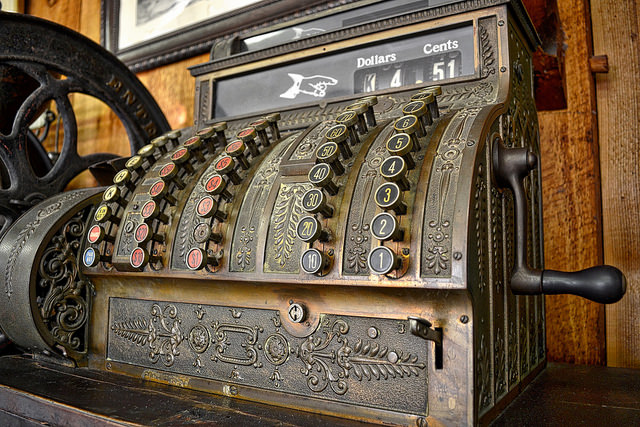Should My Church Charge for Coffee? (repost)

I’m out of the office this week, so I’m dusting off the Q&A archives and delivering up this post, originally published on January 18, 2017.
Q:
Our church has always served coffee on Sunday mornings. Due to budget cuts we’ve ended that practice. Our church has responded very well, and there weren’t any riots.
Some have proposed that we start charging for coffee. Once costs are covered, profits would go to church planting, missions, etc. I don’t love the idea of charging for coffee because I don’t think it is hospitable to our guests.
What’s the good, the bad, and the ugly of charging for coffee?
[Drew Barker, Director of Connections and Building, Redeemer Church, Lubbock, Texas]
A:
If there is a functional savior that we can all agree we have, the magical bean is it. And I get it: I polish off at least a half a pot of coffee every morning, and I have the jitters and eye twitches to prove it. I’m no prude when it comes to coffee. And free coffee? Get outta here. I’ll drink free coffee all. day. long.
But what happens when what has been free for years can’t be free anymore? I think there are a few things to consider before you pull out the cash register and start slingin’ lattes:
Find your philosophy. I’ve visited churches with nary a coffee presence on Sunday morning. I’ve been to some with the old-school silver urns and paper cups as far as the eye can see, all free for the taking. And I’ve been to churches with coffee bars that would rival Starbucks, complete with Starbucks-rivaling prices. With few exceptions, every single paid or free option seemed to fit. It wasn’t out of place or offensive. I didn’t feel ripped off paying for coffee at church, neither did I feel like the free coffee places cheaped out by serving me Folgers. The point? Your church has to find your own philosophy. What does your culture dictate and/or allow? What works in Lubbock may not work in Louisville, and what will fly at Redeemer may not pass muster at Roscoe Methodist.
Ask the why. For many years, the Summit had coffee bars at all of our campuses. We did it because it was a familiar cultural icon that brought a sense of “I’ve been here before” to newcomers, and because a 200 pound man can hide behind an 8 ounce cup of coffee (credit to Mark Waltz and Nelson Searcy for those gems). But after a while we realized that the purpose behind the bar (i.e., relational engagement) had given way to pure creature comforts (i.e., Christians throwing elbows to grab the last bottle of hazelnut creamer so they could make it into the service in time for the third worship song). In short, the coffee bar no longer served its original purpose, so we shelved it.
Determine donations vs. pricing, and basics vs. premium. There’s a difference between a coffee cup tip jar where people can drop their pocket change, and a full menu board with a credit card reader and ATM in the corner. In a similar vein, there’s a difference between straight up regular / decaf coffee with a canister of sugar vs. an espresso machine, waffle iron, and latte foam sculptures. Again, your culture will dictate much of this, but I would simply issue this warning on the premium option: make sure your coffee bar’s bells and whistles aren’t just smoke and mirrors. Don’t unintentionally foster a consumer culture because your baristas are better than the church down the street.
Cast vision from your cash register. I love the idea of putting all profits towards missions and church planting. Take it a step further and figure out how to connect here to there. Back in our coffee bar days, we often featured basic brewed coffees from regions where our church planters were serving, and we’d accompany the coffee cup with a prayer card, outlining how the coffee drinker could pray for our planter and join a short-term trip to visit them. Try that idea. Display flyers prominently, explaining exactly what the coffee coffers are supporting. And from time to time, keep people posted on exactly how many dollars their caffeine fix has supplied to missions.
Provide for your guests. This is the most important thing I can offer you: if you do charge for coffee, don’t charge your guests. Provide vouchers at the first time guest tent or welcome center, and make sure your guests know the coffee is your gift to them. From the time they pull onto your campus until they time they pull away, give them the sense that you’ve planned the weekend for them, not to get something from them. A first timer’s radar is extremely sensitive to any indication that you’re after their money. Sure, there will come a time that they start paying for their coffee. The same goes for giving financially to the church, plugging into a small group, and serving on a ministry team. The trajectory for your guests will always start as a consumer and hopefully move them into being a minister. But on that first trip? Treat ’em right.
What say you, reader? Is charging for coffee the unpardonable sin? Is serving Sanka an unforgivable error? How do you solve the coffee conundrum? Comment below.
Want to submit a Q for a future Q&A post? Do it here.
